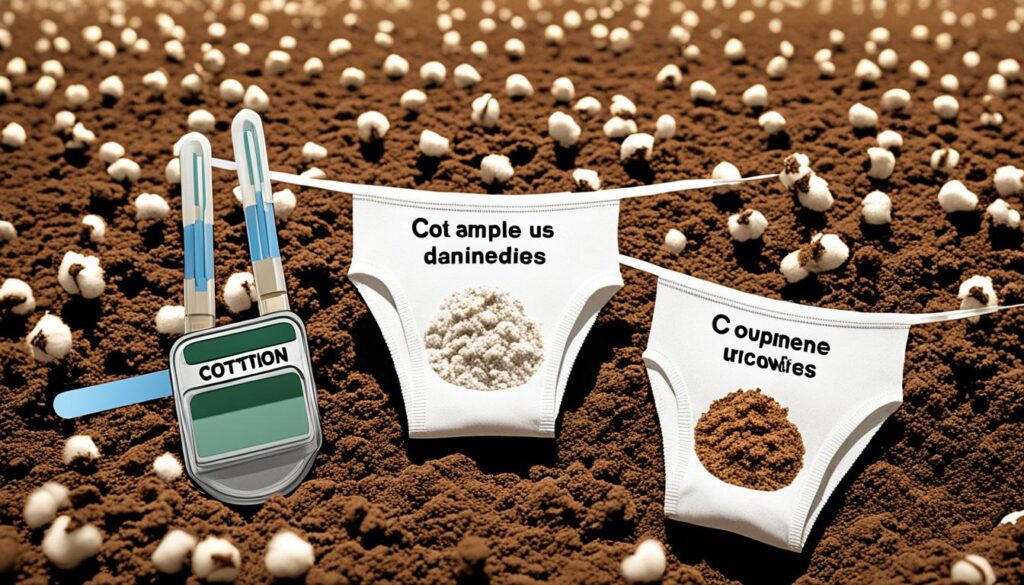Have you ever wondered if plants can thrive in soil that is completely void of microorganisms? It’s commonly believed that healthy plants rely on beneficial microbes in the soil to support their growth. However, recent research has challenged this notion, revealing that certain crops can actually flourish in microbe-free environments. This groundbreaking discovery raises questions about our understanding of plant health and opens up new possibilities for cultivating successful crops.
Key Takeaways:
- Contrary to popular belief, certain crops can thrive in soil that is devoid of microorganisms.
- Chemical fertilizers and pesticides used in agriculture can negatively impact soil health and biodiversity.
- Plant growth-promoting rhizobacteria (PGPR) can enhance plant development and improve soil health.
- Soil microbes play a crucial role in carbon sequestration, contributing to the mitigation of climate change.
- The “Bury Your Briefs” test is a simple method to assess soil microbe populations and health.
The Impact of Agricultural Practices on Soil Health
Agricultural practices have a profound effect on soil health and microbiodiversity. Unfortunately, certain conventional practices, such as the use of chemical fertilizers and pesticides, can have detrimental consequences. These practices not only deplete essential soil nutrients but also disrupt the delicate balance of microorganisms that contribute to soil health.
“The use of chemical fertilizers and pesticides in agriculture has been found to have detrimental effects on soil health and biodiversity.”
Chemical fertilizers, while providing nutrients to plants, can lead to nutrient imbalances in the soil. Over time, repeated application of these fertilizers can result in the depletion of essential nutrients, making the soil less fertile and reducing its ability to support plant growth.
Furthermore, chemical fertilizers can make the soil more acidic, which negatively impacts the overall soil pH. Acidic soil conditions can hinder nutrient availability for plants and promote the growth of harmful microorganisms, further compromising soil health.
Similarly, the use of pesticides in agriculture can have a detrimental impact on soil microbiodiversity. Pesticides are designed to kill or control pests, but they can also harm beneficial microorganisms in the soil. These microorganisms play a crucial role in nutrient cycling, disease suppression, and overall soil health.
By disrupting the natural balance of the ecosystem, pesticides create an environment that is less conducive to the presence of beneficial microorganisms. This disruption can lead to a decrease in microbiodiversity and the loss of important soil functions.
Overall, these agricultural practices contribute to the depletion, modification, and loss of indigenous and beneficial microbiodiversity in the soil. This loss of microbiodiversity directly affects the ability of plants to thrive in nutrient-deficient soil.
To promote soil health and restore microbiodiversity, it is essential to reassess and adopt sustainable agricultural practices. These practices prioritize the use of organic fertilizers, such as compost, which not only provide essential nutrients but also support the growth of beneficial microorganisms.
A shift towards organic farming methods and the integration of alternative pest control strategies can help preserve soil health and promote the coexistence of plants and microorganisms.
CLICK HERE TO CHECK OUR RECOMMENDED PRODUCTSThe Role of Plant Growth-Promoting Rhizobacteria (PGPR)
Plant growth-promoting rhizobacteria (PGPR) are beneficial microorganisms that play a vital role in enhancing plant development and improving soil health. These bacteria possess various mechanisms through which they promote plant growth, including nitrogen fixation, phosphate solubilization, and production of plant growth hormones.
By colonizing the rhizosphere, the zone surrounding plant roots, PGPR can actively improve nutrient uptake, protect against pathogens, and contribute to overall plant health. This symbiotic relationship between PGPR and plant roots creates a mutually beneficial environment, where both parties thrive and support each other’s growth.
PGPR’s ability to enhance plant growth makes them particularly useful in soils that may lack essential nutrients. By facilitating processes such as nitrogen fixation, PGPR can help plants access the nutrients they need for optimal growth and development. This not only benefits individual plants but also contributes to the overall health and productivity of the soil ecosystem.
The Benefits of Plant Growth-Promoting Rhizobacteria:
- Improved nutrient uptake
- Enhanced resistance to pathogens
- Promotion of plant growth hormones
- Increased tolerance to environmental stresses
- Improved soil structure and fertility
Research has shown that PGPR can have a significant impact on plant growth and overall soil health. Studies have demonstrated that plants inoculated with PGPR exhibit increased root growth, higher nutrient absorption, and improved tolerance to adverse environmental conditions.
Furthermore, the use of PGPR can contribute to sustainable agriculture practices by reducing the need for chemical fertilizers and pesticides. By harnessing the power of these naturally occurring beneficial bacteria, farmers can cultivate crops that are healthier, more resilient, and less dependent on external inputs.
“The presence of plant growth-promoting rhizobacteria in the soil is like having a team of dedicated helpers working tirelessly to support your plants’ growth and health.”
With their diverse array of functions and benefits, plant growth-promoting rhizobacteria are invaluable allies in nurturing plant growth, improving soil health, and promoting sustainable agricultural practices.
The Relationship Between Soil Microbes and Carbon Sequestration
Soil microbes are vital contributors to the global carbon cycle and play a significant role in carbon sequestration, which is essential for mitigating climate change. Their interactions with organic matter and the environment influence the amount of carbon stored in the soil, making them a key factor in maintaining soil health and overall ecosystem balance.
These microscopic organisms have the ability to stabilize carbon in the soil through two main processes: converting it into microbial biomass and decomposing organic matter. By converting carbon into microbial biomass, soil microbes store carbon in a more stable and long-lasting form, preventing it from being released into the atmosphere as carbon dioxide.
The decomposition of organic matter by soil microbes also contributes to carbon sequestration. As they break down plant residues and other organic materials, they release carbon dioxide into the soil. However, a significant portion of this carbon is reabsorbed by the microbes and incorporated into their structures, effectively sequestering it in the soil.
“Soil microbes play a critical role in carbon sequestration, helping to reduce the amount of carbon dioxide in the atmosphere and combat climate change.”
This process of carbon sequestration by soil microbes is crucial for maintaining soil health and fertility. It enhances the ability of soil to retain essential nutrients, improves water infiltration and retention, and supports the growth of plants and other soil organisms.
Understanding the relationship between soil microbes and carbon sequestration is essential for developing sustainable agricultural practices and land management strategies. By promoting the growth and activity of beneficial soil microbes, farmers and land managers can enhance carbon sequestration and contribute to long-term soil health and environmental sustainability.
Exploring the intricate interactions between soil microbes, carbon sequestration, and soil health is a fascinating area of research that holds immense potential for addressing climate change challenges. It highlights the importance of nurturing and protecting soil microbial communities to ensure the continued sequestration of carbon, supporting a healthier planet for future generations.
CLICK HERE TO CHECK OUR RECOMMENDED PRODUCTSAssessing Soil Microbe Populations and Health
Understanding the populations and health of soil microbes is crucial for maintaining soil health and promoting plant growth. There are various methods available to assess the abundance and diversity of soil microorganisms. One unique and visually engaging method is the “Bury Your Briefs” or “Soil Your Undies” test.
In this test, a clean pair of 100 percent cotton undies is buried in the soil for a few months. The undies act as a substrate for microbial activity. In healthy soil with a diverse population of beneficial bacteria, the cotton will be fully composted, indicating the presence of active soil microorganisms.

This easy and inexpensive test serves as a simple assessment tool to determine the health of soil microbe populations. By observing the decomposition of the cotton undies, farmers and gardeners can gain valuable insights into the microbial activity in their soil.
“The ‘Bury Your Briefs’ test is a fun and informative way to assess the health of your soil microbe populations. It provides a tangible result that can help you make informed decisions about soil management and the potential need for microbial interventions.”
A healthy soil microbe population is essential for nutrient cycling, disease suppression, and overall soil fertility. By promoting the growth and activity of beneficial bacteria in the soil, farmers and gardeners can improve soil health and enhance plant growth.
Nurturing Soil Life for Improved Soil Quality
To improve soil quality naturally, it is important to nurture soil life and create a favorable environment for beneficial bacteria and other microorganisms. By implementing simple practices, you can enhance the health of your soil, ultimately supporting optimal plant growth and productivity.
One effective way to nurture soil life is by adding compost to the soil annually. Compost provides organic matter and essential nutrients that enrich the soil, creating a thriving ecosystem for beneficial bacteria. As the compost decomposes, it releases valuable minerals and microorganisms that contribute to soil vitality.
“Compost is the key to unlocking soil health and promoting a diverse soil microbiome. By enriching the soil with organic matter, you’re not only feeding your plants, but also providing a habitat for beneficial bacteria to flourish.”
Another practice that can improve soil quality is avoiding tillage. Tilling the soil disrupts soil aggregates and can harm beneficial fungi that play a crucial role in soil health. By minimizing or eliminating tillage, you protect these important soil structures and preserve a healthy environment for soil microorganisms to thrive.
Growing a wide range of plants in your garden through crop rotation or cover crops can also support a diverse population of soil bacteria. Each plant species interacts with the soil microbiome in its unique way, benefiting different groups of microorganisms. Incorporating crop diversity into your gardening practices enriches the soil microbial community, promoting a robust and balanced ecosystem.
By implementing these practices, you can support soil life, improve soil quality, and create an environment that fosters optimal plant growth even in microbe-free environments.
| Beneficial Practices | Benefits |
|---|---|
| Add compost annually | Enriches soil with organic matter and nutrients |
| Avoid tillage | Preserves soil aggregates and beneficial fungi |
| Implement crop rotation or cover crops | Supports a diverse population of soil bacteria |
Conclusion
While it is widely believed that beneficial microorganisms are crucial for plant growth and soil health, recent studies have challenged this notion. Surprisingly, certain plants can thrive in microbe-free soil, disrupting traditional beliefs and opening up new possibilities for cultivation. By understanding the mechanisms behind plant growth in the absence of microorganisms, farmers and gardeners can explore innovative approaches to enhance plant development and productivity.
The research findings emphasize the potential of microbe-free environments for successful plant cultivation. Contrary to popular belief, soil is not solely reliant on microorganisms for nutrient availability and plant protection. This revelation challenges the conventional understanding of the role of soil microbes in supporting plant health.
With this newfound knowledge, farmers and gardeners can experiment with different techniques to foster plant growth in microbe-free soil. By employing complementary strategies such as soil amendments and crop rotation, it is possible to create a conducive environment that stimulates plant development and maximizes productivity.
Ultimately, this shift in perspective allows for the exploration of alternative methods of plant cultivation, providing opportunities for sustainable agriculture and increased food production. By embracing the complexity of soil ecosystems and investigating the potential of microbe-free environments, we can unlock new approaches to optimize soil health, plant growth, and ultimately, global food security.
FAQ
Can plants thrive in soil that is void of microorganisms?
Yes, research has shown that certain plants can thrive in soil that is void of microorganisms. While it is commonly understood that healthy plants require healthy soil, studies have found that the presence of beneficial microorganisms is not always necessary for plant growth. This challenges traditional beliefs about the importance of soil microbes for plant health.
What impact do agricultural practices have on soil health?
Agricultural practices, such as the use of chemical fertilizers and pesticides, can have detrimental effects on soil health. Chemical fertilizers deplete soil nutrients and make the soil more acidic, while pesticides harm beneficial microorganisms and disrupt the natural balance of the ecosystem. These practices contribute to the depletion, modification, and loss of indigenous and beneficial microbiodiversity in the soil.
What is the role of plant growth-promoting rhizobacteria (PGPR) in soil health?
Plant growth-promoting rhizobacteria (PGPR) are beneficial microorganisms that can enhance plant development and improve soil health. They have various mechanisms through which they promote plant growth, such as nitrogen fixation, phosphate solubilization, and production of plant growth hormones. By colonizing the rhizosphere, the zone surrounding plant roots, PGPR can improve nutrient uptake, protect against pathogens, and contribute to overall plant health.
How do soil microbes influence carbon sequestration?
Soil microbes play a crucial role in the carbon cycle and can influence the amount of carbon stored in the soil. They can stabilize carbon in the soil by converting it into microbial biomass and by decomposing organic matter. This process, known as carbon sequestration, helps to mitigate climate change by reducing the amount of carbon dioxide in the atmosphere.
How can soil microbe populations and health be assessed?
One method for assessing soil microbe populations and health is the “Bury Your Briefs” or “Soil Your Undies” test. In this test, a clean pair of 100 percent cotton undies is buried in the soil for a few months. In healthy soil with a diverse population of beneficial bacteria, the cotton will be fully composted, indicating the presence of active soil microorganisms. This test provides a simple and visual way to determine if the soil has a healthy microbe population.
How can soil life be nurtured for improved soil quality?
To improve soil quality naturally, it is important to nurture soil life and create a favorable environment for beneficial bacteria and other microorganisms. Adding compost to the soil annually can provide organic matter and nutrients for soil organisms. Avoiding tillage can protect soil aggregates and beneficial fungi, which are important for soil health. Growing a wide range of plants in the garden through crop rotation or cover crops can also support a diverse population of soil bacteria.
What are the implications of plants thriving in microbe-free soil?
Although the presence of beneficial microorganisms in soil is generally considered important for plant growth, studies have shown that certain plants can thrive in soil that is void of microorganisms. This research challenges traditional beliefs about the role of soil microbes in supporting plant health. By understanding the mechanisms through which plants can thrive in microbe-free soil, farmers and gardeners can explore new approaches to enhance plant growth and productivity.

